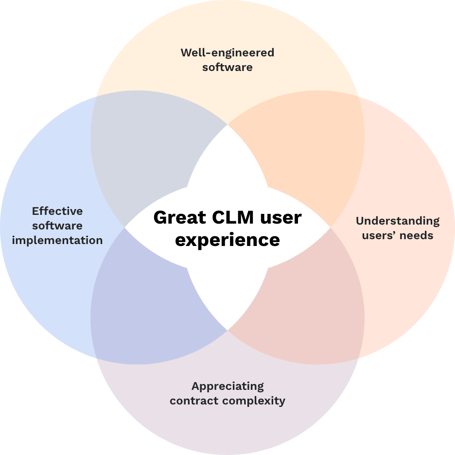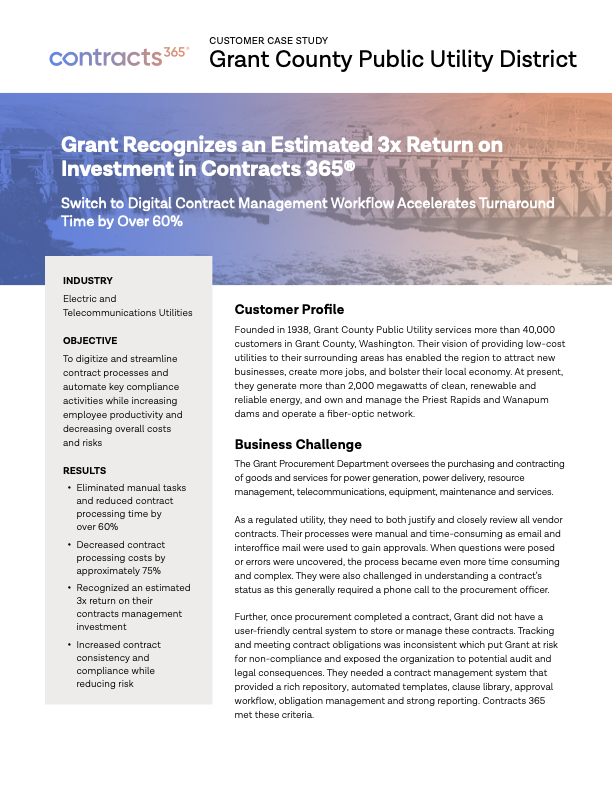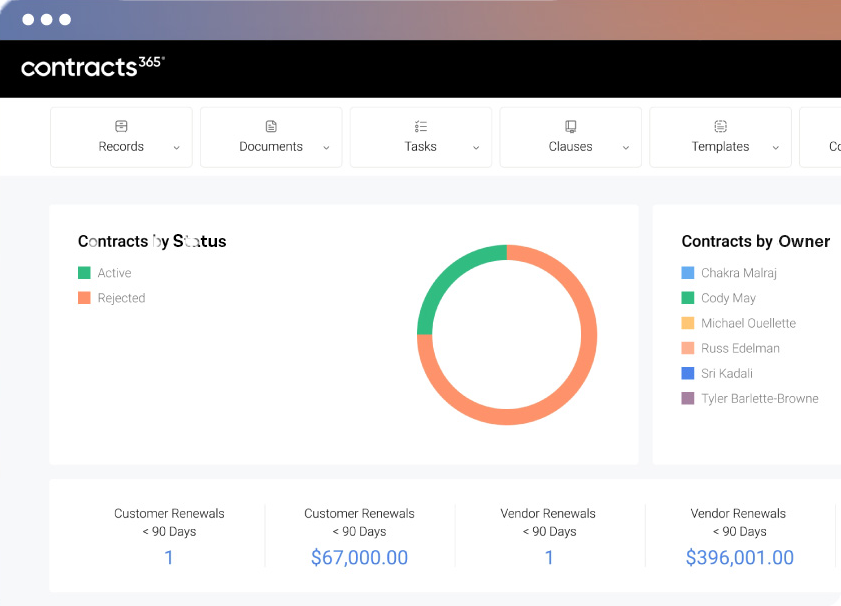10 Questions to Ask Before Investing in Contract Management Software
As businesses grow, contract management becomes increasingly complex. Businesses rely on effective management of contracts with vendors, employees, clients, and others to maintain daily operations and ensure consistent quality. With a growing number of contracts to manage, however, manual processes like creating contracts from scratch, version tracking, and workflow management become incredibly time consuming, error prone, and ultimately unworkable. Contract management software, also known as CLM software, streamlines these processes, reduces risk, and helps ensure contracts comply with internal policies and industry and governmental regulations.
Before investing in contract management software, however, it’s critical to do the research to identify the best solution for your business. To compare software, start by assessing your organization’s specific needs, and then ask questions that reveal each software’s ability to meet those needs. In this article, we’ll look at ten questions that can help you cut through the hype and find a solution that’s intuitive, robust, and fits the way you do business.

1. What are my specific business needs?
For contract management software to be a good investment, it needs to closely fit the needs of your business. The solution you choose must fit the specific requirements, standards, and regulations in your industry. Because of this, many contract management software vendors develop specialties in specific industries. Their products might include contract templates, processes, dashboards, analytics, integrations, and support designed specifically for your industry. Especially if you’re in a highly regulated industry like healthcare or energy, it’s critical to select software that helps ensure your business stays compliant with ever-changing laws and industry rules.
2. Is the interface user-friendly?
Adopting new software can create significant bumps in internal processes. To minimize the cost and disruption of implementation, you need a solution that is easy for your employees to learn and use. Consider how much training will be needed to get your staff proficient with the new technology. The interface should be intuitive and fit your current processes. Software that lacks these qualities will take longer to implement and may deter employees from using it consistently. This will not only impact the return on your contract management investment but also undermine your efforts at streamlining the contract management process.
3. Does it integrate with existing systems?
One way to help ensure user-friendliness is to choose a solution that integrates tightly with the systems your business already uses. Allowing your team to use the CLM software without leaving the applications they use every day makes it as easy as possible to fold new contract management processes into their daily tasks. Consider the systems your company currently uses for things like document creation, customer relations management, project management, communication and collaboration, and accounting. The more of these contract management software can integrate with, the more contract information can be seamlessly centralized for efficient storage, retrieval, and analysis, fueling more effective contract management.
4. Is it scalable for future growth?
Even with a user-friendly interface and tight integrations, implementing new contract management software takes time and money. To protect your bottom line (and keep your employees happy), you’ll want to avoid changing solutions more often than necessary. That’s why it’s critical to consider not only your company’s current needs but also its potential for growth. If your business begins to outgrow the software you adopt, important details like a vendor’s failure to deliver on time or contract renewal dates can easily be missed. A contract management system that can easily and cost-effectively scale as your business evolves has the potential to be the best fit both now and in the future.
5. Does it ensure compliance and security?
Cybercriminals are an innovative bunch. They’re always coming up with new ways to disrupt businesses, steal sensitive data, and hold it for ransom. A company’s contract database is a treasure trove of such information, and safeguarding it needs to be a top concern. Therefore, it’s critical to choose a contract management system that has a solid reputation for security. This is especially important for organizations in industries that must comply with heightened security standards, such as HIPAA in healthcare and the Gramm-Leach-Bliley Act in finance. At the same time, however, you don’t want to overburden employees with additional login hoops. The ideal solution will have a robust security infrastructure that can be accessed via your current authentication practices.
6. Can it be customized to fit my processes?
Contracts aren’t just the domain of the legal department. Sales, procurement, executives, and other business users are also vital to the contract lifecycle management process. As such, a contract management system needs to accommodate a variety of business roles. Software that’s designed by lawyers, for lawyers, isn’t going to cut it. The best software for this purpose will provide an adaptable interface that allows all users to stay focused on their tasks and aligned with current best practices. Make sure you’re able to customize dashboards, workflows, notifications, and alerts to fit the way the various individuals in your organization do their jobs. This will garner the widest adoption of the new technology and help ensure data is centralized for optimal management.
7. Does it provide robust reporting and analytics?
Effective contract management requires continuous monitoring of contract status, progress, and performance. However, manual processes make this incredibly time-consuming and difficult. The best contract management software includes robust analysis and reporting features that provide unprecedented visibility into all aspects of a company’s contracts. As indicated above, make sure reports are customizable to best support the role of each employee who uses them.
8. What training and support options are available?
When you invest in robust new contract management software, you don’t want to be left alone to figure out how to implement it. Look for a provider who provides the training and support your team will need to fully adopt the new system and competently use all the features that can support and streamline their roles. Consider how your employees learn best and look for providers that offer assistance in multiple formats. For example, you may want to have a representative come to your site for initial implementation and then have access to knowledge base resources and reps via phone or live chat for ongoing support. However it’s delivered, ensure your team will have continuous access to the information and answers they need.
9. What is the total cost of ownership?
To determine your anticipated return on investment (ROI) on your contract management software, you first need to understand its total cost of ownership. Calculate all costs related to the software for the duration of your subscription. This isn’t easy and requires a certain amount of guesswork, but it’s a critical step in the decision-making process. Be sure to consider costs such as these:
- Subscription fees
- Implementation, including systems configuration and change management
- Training, including the value of staff time diverted to training activities
- Software maintenance and updates
- Ongoing support
After assessing these costs, you can compare them to expected benefits, such as reduced risk and administrative costs, increased productivity, and better-informed decision-making, to estimate the system's expected ROI for your business.
10. Have I researched user feedback?
There’s nothing like customer feedback to reveal the truth of a company’s reputation for quality and service. Reviews on third-party sites can be helpful, but it’s important to be aware that these are sometimes unreliable and look for signs that reviews may be fake or manipulated. Testimonials from well-known customers and case studies published on the provider’s website may be more verifiable sources of information and provide insight into the details of how clients have experienced the implementation process, day-to-day use of the solution, and the company’s ongoing support practices.
Download the Grant Public Utility District Case Study
Learn More
Contract Management Software Designed for Microsoft Users
Contracts 365 is a cutting-edge contract management software designed specifically for Microsoft users. It utilizes the Microsoft cloud architecture as a platform and each company’s existing Microsoft 365 tenant as its contract repository. By leveraging the full depth and breadth of the Microsoft security infrastructure, including Endpoint Manager, Defender, Sentinel, and more, Contracts 365 delivers rock-solid security while maintaining customizable permissions-based access for all employees who need it—without the need for an additional login. The secure, centralized contract repository maintains version control of contract drafts and secure, easily searchable access to all contracts, both in progress and executed.
Tight integration with Microsoft tools like Dynamics, SharePoint, Salesforce, Teams, Outlook, and more makes it easy to pull data from multiple sources into the system. This capability helps streamline contract lifecycle management, eliminate errors associated with manual data entry, and break down data silos by syncing information across systems. It also allows users across business roles to access the system seamlessly, using the tools they already rely on every day. Analysis and reporting can then be tailored to the needs of each role through a customizable interface, and workflows can be automated to make everyone’s jobs easier.
Contracts 365 is dedicated to our clients’ successful implementation, providing in-person, online, and video training and ongoing support that includes 24/7 access to live representatives. For more insights on how our contract management software can streamline your contract lifecycle management processes, reduce costs, and support your company’s bottom line, browse Contracts 365’s library of free resources or schedule a demo to let us show you in person.
